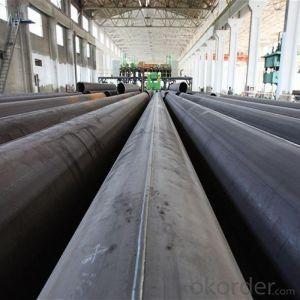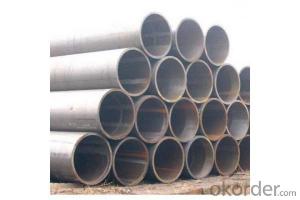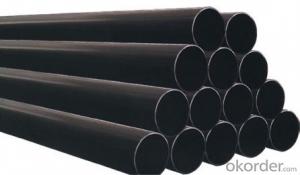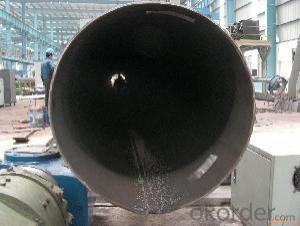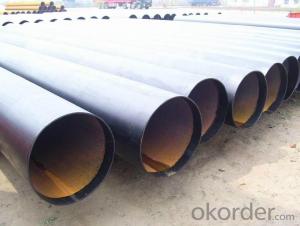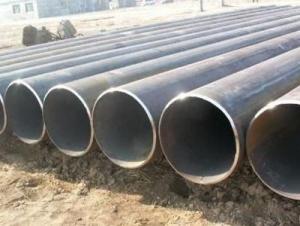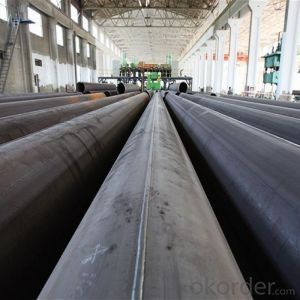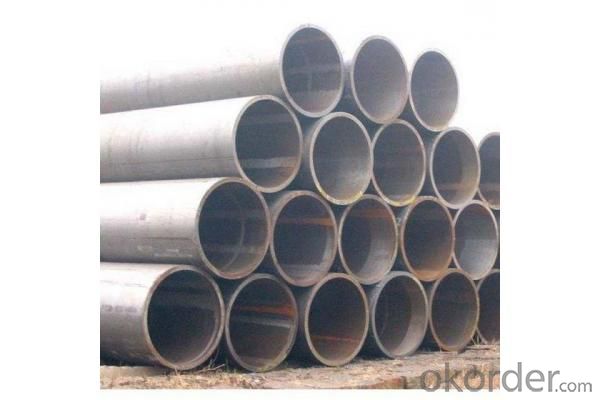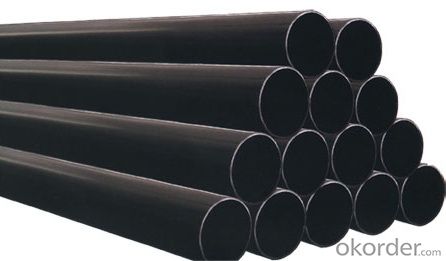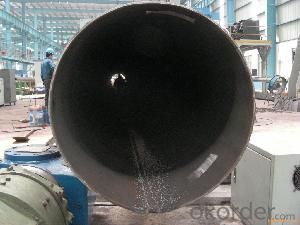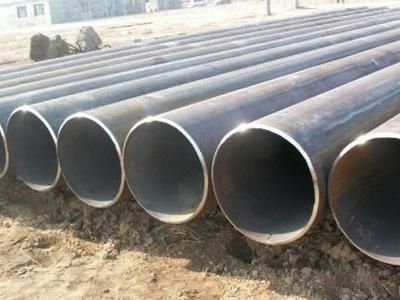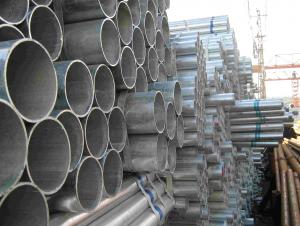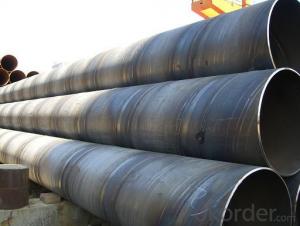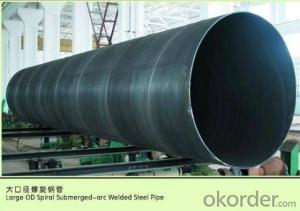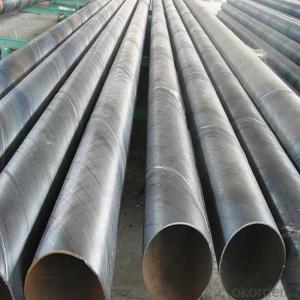API SSAW LSAW CARBON STEEL PIPE LINE OIL GAS PIPE 12''
- Loading Port:
- Tianjin
- Payment Terms:
- TT OR LC
- Min Order Qty:
- 1 m.t.
- Supply Capability:
- 3000 m.t./month
OKorder Service Pledge
OKorder Financial Service
You Might Also Like
Packaging & Delivery
Packaging Detail: | standard export packing or as customer's requirement |
Delivery Detail: | within 10 - 30 days |
Specifications
Spiral Welded Steel Pipes and Tubes
1.Material:Q195-Q235
2.Length:1-12m
3.WT:1.0-14mm
4.O.D.:20-273mm
Spiral Welded Steel Pipes and Tubes
Product Description:
1.Material : Q235,Q345,L245,L290,L360,L415,L450,L485,GrB,X42,46,X52,X56,X60,X65,X70,X80,X100
2,Standard: SY/T5037-2000,GB/T9711-2011,API Spec 5L PSL1/PSL2,ASTM A252\A53,ISO3183,DIN17172,EN10217,JIS G3457,AWWA C200,ASTM A139,ASTM A671,ASTM A672
3.Wall thickness: 3.0mm-30mm
4.Outer diameter: φ168mm-3020mm
5,Length: 5m-12m or as your requirement
6,Corrosion protection standard: DIN30670,DIN30671, AWWAC210, AWWA C203, SY/T0413-2002,SY/T0414-2002
7,Application: Oil, gas, natural gas, water pipe, thermal electricity pipe, steel structure engineering, etc
Q195-q345 Material Steel Pipe's Materials
Elements | Chemical Compsition% | Mechanical Property | ||||||
C% | Mn% | S% | P% | Si% | Yield Point (Mpa) | Tensile Strength(Mpa) | Elongation | |
Q195 | 0.06-0.12 | 0.25-0.50 | <0.050< span=""> | <0.045< span=""> | <0.030< span=""> | >195 | 315-430 | 32-33 |
Q215 | 0.09-0.15 | 0.25-0.55 | <0.05< span=""> | <0.045< span=""> | <0.030< span=""> | >215 | 335-450 | 26-31 |
Q235 | 0.12-0.20 | 0.30-0.70 | <0.045< span=""> | <0.045< span=""> | <0.030< span=""> | >235 | 375-500 | 24-26 |
Q345 | <0.20< span=""> | 1.0-1.6 | <0.040< span=""> | <0.040< span=""> | <0.55< span=""> | >345 | 470-630 | 21-22 |
Packaging & Delivery
Packaging Detail: | Normal exporting packing,in container or bulk vessel or as per clients' request |
Delivery Detail: | 2 months after confimed contract |
Specifications
Large Diameter API 5L X70 PSL2 LSAW Steel Pipe
Grade: X42, X46, X50, X52, X60, B, C
OD: 1.5"-28"
WT: SCH10-SCH160
Large Diameter API 5L X70 PSL2 LSAW Steel Pipe
Specifications:
u Standard: API 5L
u Grade: B, C, X42, X46, X50, X52, X56, X60, X65, X70, X80
u OD: 1.5"-28"
u WT: SCH10-SCH160
u Length: 5-12m
u Ends Finish: plain end, bevel end, grooved end
u Surface Treatment: bare, black varnished, oiled finish, red color, anti-corrosion, 3PE, FBE or epoxy coating
u Technique: hot rolled or cold drawn
u Application: api 5l steel pipe for conveying oil, water, gas
u Invoicing: based on theoretical weight or actual weight
u Payment Terms: L/C at sight, T/T or Western Union
u Trade Terms: FOB, CFR, CIF
u Certification: ABS manufacturing assessment, ABS design assessment, API 5CT, API 5L, DNV manufacturer certificate, ISO9001 quality management system certificate, ISO14001 environment management system certificate, GB/T28001 occupational health and safety management system certificate, A1 class manufacturing license of special equipment certificate, CCS, GL, LR, SGS, TüV, PDE
- Q: What time what time for gas pipeline steel pipe PE pipe
- PE pipe is suitable for medium voltage and low voltage 0.4MPa below the pressure pipe wall thickness. According to the different pressure is not the same, so the steel tube can be used for high pressure.
- Q: What is the primary purpose of steel pipes?
- The primary purpose of steel pipes is to transport various fluids and gases over long distances, ensuring a reliable and efficient means of conveyance in industries such as oil and gas, water supply, construction, and infrastructure.
- Q: How are steel pipes tested for mechanical strength?
- Steel pipes are tested for mechanical strength through various methods such as tensile testing, impact testing, and hardness testing. Tensile testing involves pulling the pipe until it breaks to determine its maximum strength and elasticity. Impact testing measures the ability of the pipe to withstand sudden loads or impacts. Hardness testing determines the pipe's resistance to indentation or scratching, which indirectly reflects its mechanical strength. These tests ensure that steel pipes meet the required standards and can withstand the intended applications.
- Q: How do steel pipes handle vibrations?
- Steel pipes are known for their ability to handle vibrations effectively. Due to their strong and rigid nature, steel pipes can withstand various types of vibrations, including mechanical vibrations and seismic activities. The resilience of steel pipes is attributed to their structural integrity and strength. Steel pipes have high tensile strength, which enables them to resist deformation or breakage when subjected to vibrations. They are also resistant to fatigue, meaning they can endure repeated vibrations without experiencing any significant damage. This makes steel pipes ideal for applications that involve constant or cyclic vibrations, such as in industrial settings or for transportation of fluids through pipelines. Moreover, steel pipes have the advantage of being able to dampen vibrations due to their mass. The weight of the steel pipe helps absorb and dissipate the energy produced by vibrations, preventing excessive movement or oscillation. This damping effect contributes to the overall stability and durability of the pipe system. To further enhance the ability of steel pipes to handle vibrations, various measures can be taken. These may include the use of vibration isolators or dampers, which are devices designed to reduce the transmission of vibrations from the surrounding environment. Additionally, proper installation techniques and regular maintenance can help ensure that steel pipes continue to perform optimally under vibration-prone conditions. In summary, steel pipes are well-suited to handle vibrations due to their strength, resistance to fatigue, and ability to dampen vibrations. Their robustness and durability make them a reliable choice for applications where vibrations are a concern, ensuring the safe and efficient transport of fluids or materials.
- Q: What is the role of steel pipes in the transportation of water?
- Steel pipes are of utmost importance in the transportation of water due to their durability and strength. They find extensive use in diverse water supply systems, including municipal water distribution networks, irrigation systems, and industrial water transportation. One of the primary benefits of steel pipes lies in their capacity to endure high pressure and deliver water reliably over long distances. The strength of steel enables the construction of pipelines with larger diameters, facilitating the efficient movement of substantial water volumes. Additionally, steel pipes exhibit remarkable resistance to corrosion, a critical characteristic when conveying water that may contain different minerals, chemicals, or contaminants. The corrosion-resistant properties of steel pipes ensure that the water quality remains uncompromised throughout the transportation process. Furthermore, steel pipes offer exceptional structural integrity, rendering them suitable for both underground and above-ground installations. They can withstand extreme weather conditions, seismic activity, and heavy loads, thereby ensuring the longevity and dependability of the water transportation system. Moreover, steel pipes are easy to install and maintain, apart from being robust and durable. They can be seamlessly welded together, resulting in a pipeline with minimal leakage points. Regular inspections and maintenance help identify potential issues or damages, guaranteeing an uninterrupted flow of water. In conclusion, steel pipes play a critical role in water transportation, serving as a strong and reliable conduit. Their ability to withstand high pressure, resist corrosion, and maintain water quality make them an ideal choice for various water supply systems, contributing to the efficient and sustainable distribution of water resources.
- Q: Can steel pipes be used for firefighting systems?
- Yes, steel pipes can be used for firefighting systems. Steel pipes are commonly used for their durability and resistance to high temperatures, making them suitable for transporting water and other fire suppression agents. They are typically used in larger commercial or industrial buildings where the fire protection system requires a higher flow rate and pressure. Steel pipes also have the advantage of being able to withstand external forces and impacts, ensuring the integrity of the firefighting system. Additionally, steel pipes can be easily connected, making them convenient for installation and maintenance purposes. However, it is important to ensure that the steel pipes used for firefighting systems are properly treated to prevent corrosion and rusting, as this can compromise their effectiveness in an emergency situation. Regular inspections and maintenance should be conducted to ensure the reliability and functionality of the steel pipes within the firefighting system.
- Q: How do you calculate the pipe buoyancy for steel pipes in water?
- To calculate the pipe buoyancy for steel pipes in water, you need to consider the weight of the water displaced by the submerged portion of the pipe. This can be done using Archimedes' principle, which states that the buoyant force on an object immersed in a fluid is equal to the weight of the fluid displaced by the object. First, calculate the volume of the submerged portion of the pipe. This can be done by multiplying the cross-sectional area of the pipe by the length of the submerged portion. Next, determine the density of the water in which the pipe is submerged. Typically, this value is around 1000 kg/m³ for freshwater and slightly higher for seawater. Multiply the volume of the submerged portion of the pipe by the density of the water to find the weight of the water displaced. Finally, compare the weight of the water displaced to the weight of the steel pipe. If the weight of the water displaced is greater than the weight of the pipe, the pipe will be buoyant and tend to float. If the weight of the pipe is greater, it will sink. It's important to note that other factors such as pipe design, wall thickness, and external forces acting on the pipe may also influence its buoyancy. Therefore, it's recommended to consult industry-specific guidelines or seek expert advice for accurate calculations in specific scenarios.
- Q: How are steel pipes used in the construction of water treatment plants?
- Steel pipes are commonly used in the construction of water treatment plants for various purposes such as transporting water, carrying chemicals, and handling wastewater. They are often used as the main conduits for distributing treated water throughout the plant, as well as for supplying raw water from the source to the treatment facility. Steel pipes also play a crucial role in the transportation of chemicals used in the treatment processes, ensuring their safe and efficient delivery. Additionally, steel pipes are utilized for the disposal of wastewater and sludge, allowing for proper drainage and disposal systems within the plant. Overall, steel pipes are essential components in the construction and operation of water treatment plants, providing the necessary infrastructure for the efficient and effective treatment of water.
- Q: How are steel pipes protected against corrosion in marine environments?
- Steel pipes are protected against corrosion in marine environments through various methods, including the use of protective coatings, cathodic protection systems, and selecting corrosion-resistant materials.
Send your message to us
API SSAW LSAW CARBON STEEL PIPE LINE OIL GAS PIPE 12''
- Loading Port:
- Tianjin
- Payment Terms:
- TT OR LC
- Min Order Qty:
- 1 m.t.
- Supply Capability:
- 3000 m.t./month
OKorder Service Pledge
OKorder Financial Service
Similar products
Hot products
Hot Searches
Related keywords
